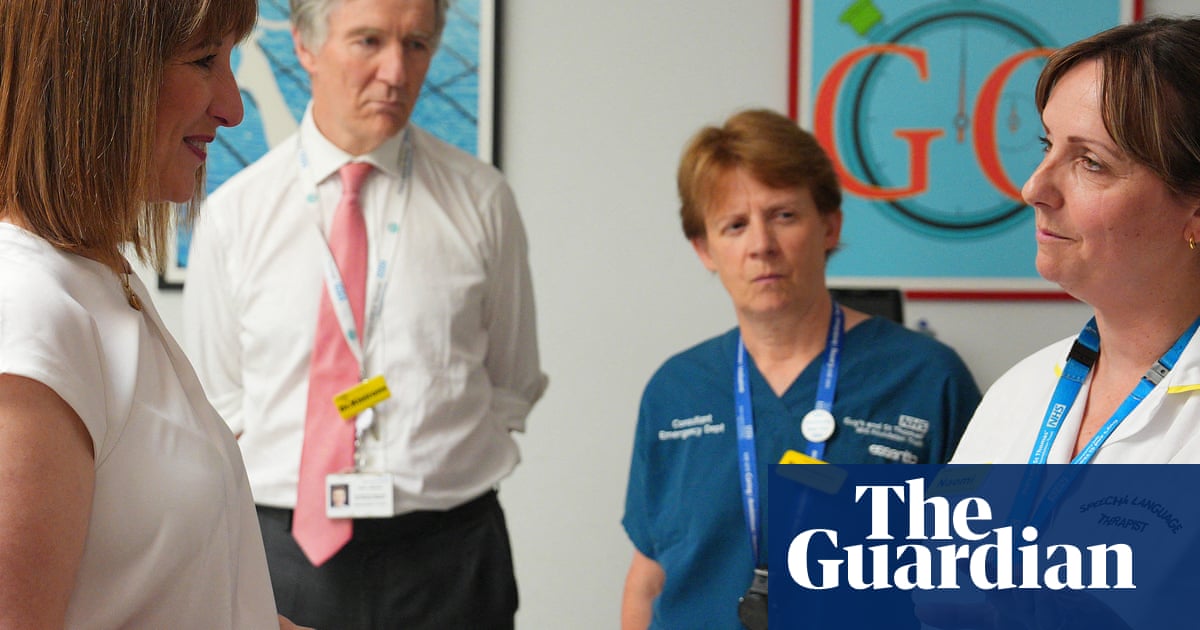Rachel Reeves’smultibillion-pound plan to repair public serviceswill benefit Britain’s poorest households most but means tax rises are likely this autumn, according to a leading thinktank.
TheResolution Foundationsaid the extra funding for hospitals, schools and the police announced by the chancellor would provide a valuable “benefit-in-kind” for households who would gain from the improvements.
A middle-income household would gain the equivalent of £1,400 a year on average by the time of the next general election through access to better services, rising to as much as £1,700 for the poorest fifth of households in the country.
However, the thinktank warned that Reeves could be forced into further tax increases to maintain higher levels of spending at the forthcoming autumn budget, amid a worsening outlook for the economy and public finances.
“A combination of a weaker economic outlook, an unfunded spending commitment on winter fuel payments, and just £9.9bn of headroom againstthe chancellor’s fiscal rules, mean further tax rises are likely to be needed this autumn,” it said.
Reeves used Wednesday’s spending review to prioritise funding for the NHS, defence and more than £100bn for long-term capital projects despite leaving some key areas facing a tough squeeze.
In a pivotal speech to the Commons setting out Labour’s plans up to the next general election, the chancellor said she was taking action to “renew Britain” after years of underinvestment and austerity measures overseen by successive Conservative-led governments.
The Resolution Foundation said the package showed that Britain was turning into a “National Health State”, with health accounting for 90% of the extra spending announced.
In a major reshaping of the state, it calculated the NHS was on track to account for half (49%) of all day-to-day public service spending controlled by Westminster by the end of the decade – up from a third (34%) in 2009-10.
The thinktank said real day-to-day spending was now rising again in the 2020s by 2.2% a year, after a 0.5% fall per year in the 2010s. However, in the decade prior to that under the last Labour government, spending rose by 4.3% on average each year.
While the health service is taking up a larger share of public spending, other areas have faced real-terms budget cuts, including a 16% reduction in real, per-person funding for justice and a 50% decline for housing, communities and local government since 2010.
Sign up toBusiness Today
Get set for the working day – we'll point you to all the business news and analysis you need every morning
after newsletter promotion
However, experts warned that Reeves could face a summer of speculation over tax increases in the run-up to the autumn budget. Mel Stride, the Conservative shadow chancellor, said: “This is the spend now, tax later review, because [she] knows she will need to come back here in the autumn with yet more taxes.”
Labour argues that its plans allocate money that has already been raised, highlighting that the spending review is based on last year’s autumn budget and this year’s spring statement, when the Office for Budget Responsibility judged that Reeves was meeting her main fiscal rule to balance day-to-day spending with revenues within the fifth year of its forecast.
However, economists warned that a weak growth outlook and rising government borrowing costs amid Donald Trump’s global trade wars could blow the chancellor’s plans off course. This could force the OBR to downgrade its forecasts for the government finances, which would require Reeves to take action to announce spending cuts or tax rises if she wanted to stick to her fiscal rule.
Andrew Goodwin, the chief UK economist at the consultancy Oxford Economics, said: “Considering the government’s recent U-turn on winter fuel payments could be a precursor to higher government spending in other areas, it looks increasingly likely that substantial tax increases will be needed.”
